中职英语第二册a letter to a friend
浅谈中职英语教学——《A great friend》课堂教学反思

21 0 1年 第 3 2期
浅谈 中职英]
— —
《 ra re d A getf in >
江 苏省江都 市职教 集.
[ 摘要] 本文通过一堂中职英语教学案例的对比 展 学生思维, 教给学生终身 实用的英语知识和技能, ‘ 个切 实问题 , 并提 出 了如何 实施 的建议 。 [ 关键词 ] 中职英语 教 学反思
3 2
中等职业教育
21 0 1年 第 3 2期
读后 中, 发现学生阅读难点所在 , 然后梳理文章 的篇章结 构, 解析词句难点 , 最后 让学生对错误选项再进行判 : 重 断 、 应 选择 。 在这 个过程 中 , 教师 的教 和学生 的学 结合 得融洽 、 紧凑 。 刚开始 , 学生 的做题结果并不重 要 , 重
此, 笔者安排 了另一场关 于 bo ok和 cm ue 的辩论 两堂课 的不足在于讨论 的时间很长 。从 培养 学生的 o p tr
赛。 双方辩论前 先行讨论 。 准备 后 ,o p tr cm ue 组认 为 , 阅读能力以及学 习英语知识 的角度考虑 ,该课课 堂 电脑能容纳 的信息是一本书无法 比的, 中什么知 教学效 率不高。 电脑 识都 有, 是最渊博 的。ok组认 为 , 时间上看 , 堪称 bo 从
兴趣 ; 之 , 生会逐 渐厌学 。 反 学 教师 在进行英语 教学
应充 分利用教材和其他教学 资源 , 激发学生参与 笔者在进行阅读教学时发现 ,辅 导书上对学生 时 ,
进行 阅读训练 的文章 , 的 比教材 中的难度大 , 有 于是 学 习的热情 ,使其融 入课 堂学习的氛 围中,身心愉 快乐地学 习。 推行 把阅读课文首先作为 阅读测试 ,让学 生通过略 悦 , 读 、细读来 完成相应 的练 习题 ,在检查答 案的过程
中职英语第二册a-letter-to-a-friend

• • On weekdays 在每周的工作日 • Class 班级, 课
大家好
13
• In the afternoon ,we sometimes go to the skill training center of our school to
practice cooking .
大家好
11
• With the help of the teachers and classmates ,I’m glad to say that everything
• Is going better and better.
• 我可以很高兴的说, 在老师和同学们的帮助 下, 一切都变得越来越好。
Unit2 A Letter to a Friend
大家好
1
• Dear Nancy,Greetings from Beijing. • 亲爱的南希, 来自北京的问候
• Dear 在书信开头表示客套, 常与职衔, 称呼 或名字连用。
• Greeting 问候(名词) • Greet 打招呼(动词)
• 你知道, 我只能讲和理解非常少的汉语。
• Only 仅, 只 • Little 少, 用于修饰不可数名词 • Few 少, 用于修饰可数名词复数
大家好
8
At first ,I couldn’t follow the teachers in class and I felt a little nervous.
• 在下午, 我们有时去学校的技术训练中心去 练习烹饪。
• Sometimes 有时
• Skill training center 技术训练中心
中职英语第二册课件

Sentences
1. Why do you look so sad? 你怎么这么难过?
2. I don‘t have anyone to play with. 没人陪我玩。
3. You will soon make friends here. 你将很快在这儿交到朋友。
4. I live next door. 我住隔壁。
1. sad
难过的,悲伤的
拓展:表达心情的词语
happy
高兴的
excited
难过的
surprised
惊讶的
afraid
害怕的
angry
生气的
I’m in blue.= I’m sad.
Vocabulary
测一测
1. What does the A. happy B. cheerful C. sad D. excited
Text Lesson One A Good Way to Make Friends
Mother said we would soon be good friends, "Tom answered. "I'm glad your mother needed two eggs," said Bob. “She just wanted to make friends with your mother!” Then Bob laughed, too. “That is a funny way to make friends,” he said. “But it’s a nice way. It worked.”
send sb sth
送某人某物
= send sth to sb
中职英语第二册alettertoafriend

? 课后,我们有许多有趣的活动。
? interesting 有趣的,形容物 ? Interested 有趣的,形容人 ? Activity …Activities (复数)
大家好
15
? On weekends, I often go to have classes of Chinese language or go sightseeing around the great and beautiful city of Beijing.
? 在周末的时候,我经常去上汉语课或者去 美丽伟大的北京周围观光。
? On weekends在周末
? Go sightseeing 去观光
大家好
16
? How are you getting along ? ? 你一切还好么? Get along 进展
I miss you very much . 我很思念你 Miss 思念、丢失
? 我现在写信告诉你,在这里我过的很愉快, 而且很幸运成为新华职校的一名学生。
? Am writing 正在写,是现在进行时的形式 (be doing ),表示现在正在进行的动作。
大家好
4
? Have a good time 过的愉快 ? Be lucky to do sth 很幸运去做某事
大家好
大家好
11
? With the help of the teachers and classmates ,I'm glad to say that everything
? Is going better and better.
? 我可以很高兴的说,在老师和同学们的帮 助下,一切都变得越来越好。
Unit2 A letter to a friend II.ppt

Reading 第7课时
1.教学目标 1).学习Reading 3—6段 2 ) . 掌 握 重 点 短 语 : on weekdays ; get along ; have classes; send text messages; practice doing sth.等的用法。 3).继续培养学生的自学能力。 2.重点、难点
根据课文(Reading3--6段),完成下列句子。 1 .In the morning, we usually have classes ______in our classroom. 2.In the afternoon _________, we sometimes go to the skilling training center of our school. 3.After class, we have many interesting ________________. activities 4 .On weekends ________, I often go to have classes of ____________ Chinese getting along 5.How are you _________________? send 6.You may_____text messages to me on the phone. With best wishes! 7.____
翻译写列句子
1.课后,我们有很多有趣的活动。
After class,We have many interesting activities.
2.他每周平时都是六点钟上班。
He goes to work at 6 o'clock on weekdays.
河南中职英语(语文出版社)Unit4课文学习1

2.回答问题
Reading Comprehension I 1.T 2.T 3.T 4.F 5.T 6.F
词组小结
• 1.交朋友
• 2.在......中起作用 • 3.一些 • 4. 许多 • 5.互相 • 6. 跟......分享 • 7. 依赖
8. 在需求中 9. 愿意做 10. 同意 11. 生某人的气 12. 保持沉默 13. 顺便说一下 14. 为.......做好准 备
重点短语
1.make friends 交朋友 2.play a part in 在......中起作用 3.a few 一些 4.a number of 许多 5.each other互相 6.share…with 跟......分享 7.rely on 依赖 8.in need 在需求中 9.be willing to 愿意做 10.agree to 同意 11.get angry with 生某人的气 12.keep silence 保持沉默 13.by the way 顺便说一下 14.get ready for… 为.......做好准备
布置作业:
1、熟读课文,hip
课文学习(1)
教学目标:
• 1、知识目标:通过领读、朗读等形式让学生会读本单元课文。 • 2、能力目标:会读课文,理解文章内容,准确回答课后问题。 • 3、情感态度价值观目标:通过课文学习,了解社会,礼貌交际, 形成服务意识。
交朋友 朋友在我们生活中担任重要角色。我们可能有很多朋友,但是通常我们不十分 清楚如何去交朋友。我们也许和很多人相处很好,但我们通常只和少数人交朋友 。 人们随意地使用朋友这个词。朋友也许是从童年就彼此了解的人,或者是最近 才遇到的。事实上,人们也许有不同的朋友,例如在学校的朋友,工作上的朋友 ,或者一起运动的朋友。一个人也许会为不同的活动选择不同的朋友。如果你们 在操场上玩耍,这个人就是你的玩伴。如果你和一个朋友下棋,这个人就是你的 棋友。 一个人也许有很多好朋友,并且只有一个最好的朋友。最好的朋友或亲密的朋友 通常是指彼此认识很久一段时间的人。亲密的朋友是指一个和你可以分享快乐和 悲伤的人。一个你可以在需要帮助时依赖的人,一个你愿意伸出援助之手的人。 友谊是一生中最好的财富之一。但是,不要期望朋友会为你做任何事。正如法国 一个作家说过的,“不要走在我前面---我不会跟随。不要走在我后面---我不会 引导。只需走在我傍边---并且成为我的朋友。”
中职《英语》第二册 Lesson 11

Why not go to the concert with me?
Then you should go hiking.
Perhaps you should go to a disco.
I guess you should just stay at home and read a book.
No,there’s too much noise.
What do you think is the healthiest and the most interesting way of spending the weekend?
Interview some people about how they usually spend the weekend and what they think is the healthiest way of spending the weekend. Write it down on the exercise book.
Wenzhou amusement Park
Wenzhou Zoo
Jingshan Park
Suggested Structures
Ask for advice(征求意见) ◆Do you have any ideas on where I should go? ◆I don’t know what to do this weekend. ◆Can you tell me where is a good place to spend the weekend?
That’s a good idea!
Listen & Answer
语文版中职英语(基础模块 上册)Unit 3《Campus Life》ppt课件2

P20 Reading Comprehension (阅读理解) Jennifer 1. David is writing a letter to ___________. Vocational 2. Now David is a student of Haidian _________ School Beijing _________ in __________. Chinese 3. David came to Beijing to learn __________ cooking ago _________ a month _________. got to 4. When he _________ ________ this school, everything ___________ ________ strange to him. was speak At 5. ________ first, David could not________ and _________ understand Chinese.
P19 Reading
A Letter to a Friend
第3段译文: 一个月前,我来到北京。当我到这所学校的时候,一 切对我来说都是陌生的。你知道,我不会说也不懂汉 语。起初,我听不懂老师讲课并感到紧张。幸运是, 这里所有的老师和同学都对我很友好和善,十分关心 我的生活和学习。现在,我可以高兴的说,在老师和 同学的帮助下,一切进展顺利。
P19 Reading
A Letter to a Friend
第4-6段译文: 我们每周一到周五上午四节课,下午三节课。上午, 我们通常在教室里上课。下午,我们有的时候去技术培 训中心练习烹饪技术。 课后,我们有很多有趣的活动。在周末,我经常去上 汉语语言课,或在这座伟大美丽的北京城里观光。我在 这里过得很愉快。 你怎么样?我很想念你。我的新电话号码是: 13523796588,我的e-mail地址是: dbrown@。你可以给我发e-mail或手机短信。 致以最美好的祝愿!
Unit2 Friends and friendship(中职英语第二册 unit2)
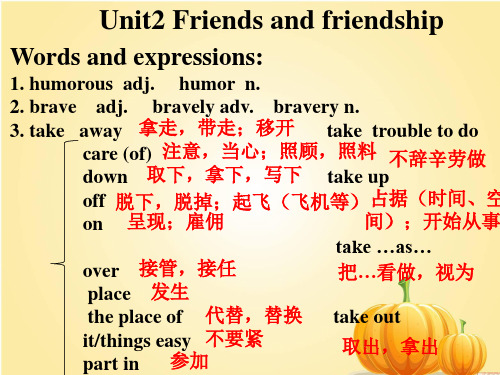
12. Members of sentence(句子的成分) 定义:构成句子的各种不同要素。 句子的主要成分是主语和谓语,次要成分是 表语,宾语,定语,状语和宾语补足语。 1. 主语:是句子所说明的主体,是动作的执 行者,表示句子里谈的是“什么人”,“什么 物”,“谁”.一般由名词、代词或相当于名词 的词、短语或句子充当。 All the students here are from the countryside. Getting up early will do good to your health. The heavy rain still rains. Betty is a good girl.
4. fail to do sth. / fail in sth. 5. count on=depend on=rely on依靠,依赖 If I have some difficulties , I will count on you. I want to count on you to help me English. 6. how long…表示多长时间,主要用来对一段时间 (如three days, four weeks 等)提问. A:How long did he stay here? B:About two weeks. 或表示某东西有多长。 A:How long is the river? B:About 500 km.
2. 谓语: 是说明主语的动作或状态,常由动词担 任,一般放在主语之后。 He likes watching TV after supper. The students behave well at school. 3. 宾语: 是表示动作的承受者。常由名词或相当 于名词的词担任,放在及物动词或介词之后。 I bought an English-Chinese dictionary. First, you should choose a friend. 4. 表语: 是谓语的一部分,与连系动词一起构成 谓语,表示主语的性质、特征、身份等。一般 由名词、形容词或相当于名词或形容词的词或 短语充当。
中职高考英语短语

一、短语1:welcome to 欢迎2:vocational school 职业学校3:be glad to do 很高兴做4:classroom building 教学楼5:many teachers' rooms 许多办公室6:on the third floor 在三楼7:a lot of 许多8:next to 紧挨着9:let sb do sth 让某人做某事10:study hard 努力学习11:students' dormitory学生宿舍11.reading room 阅览室12.after class 课后12:look at 看13.thank…for 为..而感谢13:a picture of my family 全家福14:retired worker 退休工人15:be kind to 对…… 和蔼可亲16:help sb do sth 帮助某人做某事17:enjoy doing sth 喜欢做某事18:live together with和某人一起生活19:be popular with 受……欢迎20:on the right 在右边21:medical college 医学院22:dream to be 梦想成真23:on the right 在右边24.on the left 在左边24:be full of 充满25.a pair of 一双25:a letter to a friend 给朋友一封信26:greetings from 来自……问候27:learn Chinese cooking学习中餐烹饪28:get to 到达29:at first 起初30:follow sb 理解某人的话31:in class 在课上32:feel nervous 感到紧张33:show concern about对…表示关心34:with the help of sb在某人的帮助下35:go well 进展顺利36:have lessons =haveclasses上课 38:the skilltraining center技能训练中心39:practice doing sth 练习做某事40:after class 课后41:on weekends 在周末42:go sightseeing 去观光43:have a good time玩的高兴,过的愉快44:get along 进展45:telephone number 电话号码56:text message 手机短信57:on telephone 在电话中58:with best wishes致以美好的祝愿59:a gift from sb 来自…礼物60:by plane 乘飞机61:will you please do sth请你…好吗62:at nine thirty 在九点半63:on time 准时64:in time 及时65:look forward to doingsth期盼做某事66:no problem 没问题67:don't worry 别担心68:get up 起床69:have enough time todo sth 有充足的时间做某事70:leave for 动身前往71:play a computer gameonline上网玩电脑游戏72:in great joy 兴高采烈73:hurry to 匆忙去75:two hours late 两小时后76:get home 到家77:talk with sb 与某人交谈78:be delighted to do sth很高兴做某事79: be busy with 忙于做79.no matter what 无论什么80:take a taxi 打车81:here from 来这82:too…to太…而不能83:be ashamed to do sth羞愧做某事84:look+adj 看上去85:give sth to sb 给某人某物86:give sb sth 给某人某物87:have breakfast 吃早餐88:do morning exercises做早餐89:like to do sth 喜欢做某事89.a glass of 一杯90:hot dog 热狗91:fried chicken 炸鸡92:in the north of 在…的北方93:the most popular 最受欢喜的94:on festivals 在节日里95:the Spring Festival 春节96:New Year's Day 新年97:come back home 返回家98:get together 聚会99:by oneself 亲自100:a way to save time节约时间的一种方法101:more and more popula r越来越受欢迎102:potato chips 炸薯条103:have to 不得不104:tell sb not to do sth 告诉某人不能做某事104.ice cream 冰淇淋105:in fact 事实上106:be good for 对…有好处107: fast food 快餐107. junk food 垃圾食品108:a bowl of rice 一碗米饭109:make dumplings 包饺子110:the kinds of 那几种111:order…from 向…订购112:do me a favor 帮我一个忙113:lend sb a head 帮忙114:take seats =take a seat就座115 because of 因为116:from…to 从…到117:in the fields 田野里118:begin to sth 开始做某事119:turn green 变绿120:come out 生长121:plant trees 植树122:cones after 在…之后到来123:this time of a year 一年当中的这个时候124:go to the seaside 去海边125:on vacation 度假126:stay in 住在127:go swimming 去游泳128:watch TV 看电视129:have seafood 吃海鲜130:the harvest time 收获季节131:get cooler 变冷132:be happy with 因…而高兴133:go skating 去滑冰134:go skiing 去滑雪135:be different from与…不同136:heavy rains 暴雨137:dark screen 黑屏138:get …into trouble使…陷入困境139:havetrouble(in)doing做某事有困难140:be in trouble 处于困境141:wait for 等待142:be down 死机143:allow sb do sth 允许某人做某事144:be allowed to do sth被允许做某事145. allow doing sth允许做某事146:look around 环顾四周147:whether or not 是否148:have on way to do没办法做149:find out 找出150.on business 办事,出差151:point at 指向152:not…but 不是…而是153:it's clear that 很明显154:work on 操作155:be late for 迟到156.booking office 售票处157:have no idea 不知道158.What a pity! 真可惜!真遗憾159:a friend of mine 我的朋友160:agree with 赞同161:remind sb of sth使某人回想起某物162: be full of 充满163:feel sorry for sb 为某人感到遗憾164:expect sb to sth 期待某人做某事165:give up doing sth 放弃做某事166:(one's)the way to 通往…的路167:go on to do 继续做某事168:go on doing 继续做某事169:overcome difficulties克服困难170:phD program 博士课程177:be active in doing 积极做某事178:be out of school 失学179:not …until 直到…才180.something wrongwith …有毛病181:take it easy 别着急。
中职山东省职业教育教材编写组高等教育出版社英语第二册第4版Book 2 Unit6-10英语教案
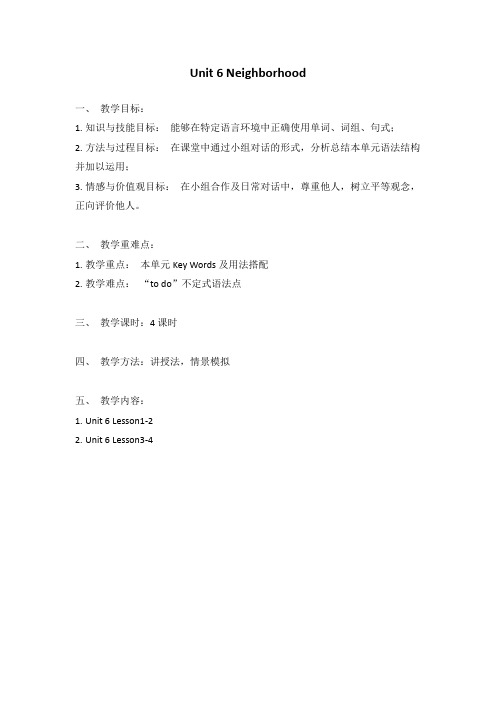
Unit 6 Neighborhood一、教学目标:1.知识与技能目标:能够在特定语言环境中正确使用单词、词组、句式;2.方法与过程目标:在课堂中通过小组对话的形式,分析总结本单元语法结构并加以运用;3.情感与价值观目标:在小组合作及日常对话中,尊重他人,树立平等观念,正向评价他人。
二、教学重难点:1.教学重点:本单元Key Words及用法搭配2.教学难点:“to do”不定式语法点三、教学课时:4课时四、教学方法:讲授法,情景模拟五、教学内容:1.Unit 6 Lesson1-22.Unit 6 Lesson3-4一、Key Words1.Neighborhood: n. 社区,街区Neighbor: n. 邻居“-hood”加在名词后,构成虚拟名词,表一种状态例:boy-boyhood;child-childhood2.Downtown: n. 市中心反义:suburb3.Crime: n. 犯罪(严重违法行为或罪)形容词:criminal各种“罪”Sin:违反道德原则或反宗教的过失Guilt:违反社会道德,含应予惩办之意Violation:违背誓言、条约、良心或权利4.Rent:v. 出租;n. 租金Rent for sth 供出租5.Bet: v. 打赌,断定Make a bet 打赌Bet on 在……上打赌6.Convenient:a. 方便的It’s convenient to do sth名词:convenience 方便性副词:conveniently 方便地7.Excellent:a. 极好的名词:excellence 优秀,卓越词根:excel:v. 擅长,胜过8.Suppose:v. 假设,认为Be supposed to do 应该做某事9.Blonde:a. 金发的10.Jeans:n. 牛仔裤Pants 短裤11.Alone:adv. 独自地Lonely:adv. 孤独地12.Require:v. 需要Require sb to do sth 要求某人做某事Require doing= require to be done 需要被名词:requirement 要求符合要求:meet ones requirementsplete:v. 完成,结束;a. 完全的,齐全的,完成的Complete with“-plet”后水,表示“满”名词:completion 完成,结束,圆满各种“完成”:Finish:圆满结束或完成已着手的Complete:完成预定的任务或使某事完善,补足缺少的部分End:最普通,也指突然中止Conclude:正式用语14.Improve:v. 提高,改善Improve sth名词:improvement15.Project:n. 项目,工程16.Benefit:n. 利益,好处;v. 从…获利Benefit from形容词:Beneficial二、语法:to do 不定式1.作主语,一般需要形式主语例:To become a teacher is her wish.转换:It is her wish to be a teacher.2.作宾语:(v. +to do 的形式)常见此结构动词:ask, choose, agree, except, learn, prefer,pretend, wish, want, would, like, love3.作宾语补足语(简称宾补)常见此类结构动词:ask, allow, advise, except, invite, encourage, teach, tell, want, wait for, wish, would like例:I want to invite her to have dinner at my home.4.作状语1)表目的:in order to, so as to2)表结果:too……to, enough……to, only……to3)原因状语:sb+v. + a. +to do5.作定语6.作表语:跟在be动词后面,主语是wish,idea,task,jobUnit 7 Job Hunting一、教学目标:1.知识与技能目标:能够在特定语言环境中正确使用单词、词组、句式;2.方法与过程目标:在课堂中通过小组对话的形式,分析总结本单元语法结构并加以运用;3.情感与价值观目标:在小组合作及日常对话中,创设求职场景,梳理职业平等观念,培养学生爱岗敬业的工作作风。
unit 2 a letter to a friend (reading and writing)给朋友的一封信

Stamp
Nancy Puyang county Vocational School 19 Hongqi Road Puyang 457100
收信人的姓名和 地址
Listen to the text and answer the following questions.
1 Who did Jack write a letter to?
4.In the afternoon, we sometimes go to the skill training center of our school to practicecooking skills.
下午我们有时去学校的技能训练中心练习烹饪技能。
1) to practice cooking skills “练习烹饪技能”,动词 不定式短语作目的状语。又如: He often goes to the playground to practice football. 他常去操场练习踢足球。 2) practice n. “练习;训练”。例如:
I’m very lucky to have you as my friend.
2.A month ago, I came to Beijing to learn Chinese cooking. 一个月前我来到北京学习中国烹饪。 came 是动词come 的过去式。注意不规则动词的过去 式形式,go went; get got; feel felt。 动词过去时表示过去某个时间发生的动作或存在的状 态。例如: She felt a little nervous when she came in this morning.
今天早上她进来时有点紧张。
3.At first, I couldn’t follow the teachers in class and I felt a little nervous. 起初,在课堂上我听不懂老师讲课并感到有点紧张。 1) at first“起初”。 eg He didn’t talk with others at first. 起初,他不和别人说话。 2) follow“跟随,跟得上”。本句中follow 为“跟得上,听得 懂”的意思。又如: Sorry, I can’t follow you. 对不起,我没听懂你说的话。 3) a little “有点儿”。例如: I only have a little money on me. little“很少”。例如: Hurry up, there is little time for you.
中职英语-公开课教案
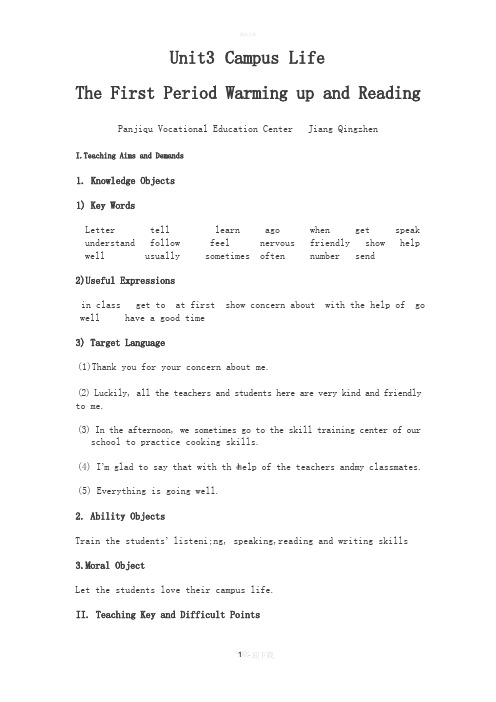
Panjiqu Vocational Education Center Jiang QingzhenLetter tell learn ago when get speak understand follow feel nervous friendly show help well usually sometimes often number sendin class get to at first show concern about with the help of go well have a good time(1)Thank you for your concern about me.(2) Luckily, all the teachers and students here are very kind and friendly to me.(3) In the afternoon, we sometimes go to the skill training center of ourschool to practice cooking skills.(4) I’m glad to say that with th elp of the teachers andmy classmates.(5) Everything is going well.Train the students’ listeni;ng, speaking,reading and writing skillsLet the students love their campus life.1. Students can introduce campus life.2. Pay attention to the form of a letter.3. Students can master key words and phrases.1.Practice methood .2.Four-skill method.1.Practice2. Role play.3.cooperation.1. Some pictures3. A small blackboard2. A tape recording1. Greeting each otherT: Class begins.Ss: Good morning, teacher!T: Good morning, class! Sit down, please.Ss: Thank you.2. Look at the pictures of our new schoolT: Today, I’m very glad. I have some beautiful pictures of our new schoolto show you , Please look at these pictures. This is our new school. Thatis a classroom, i s big and bright . This is a library, That is a dininghall. This is a dormitory and that is a playground. Please read the words “school, classroom, library, playground, dining hall and dormitory ”after me.( In this part, let the students master school buildings and equipment teatatively.)3. Ask and answer(1) T: Look at the pictures, ask and answer in pairs with the following sentence sructures:A: What’s this \ that in English?B: It’s a_______.A: What’s in it?B: There are some/ many / a lot of ___________ in it.T: I’ll give you a few minutes to pracice in pairs.(2) Ask a few pairs to practice dialoges in pairs.( In this part, train the students spoken English and let them go over the knowledge of Unit1 and Unit2.)Step2 Presentation1. Lead in the students’ campus lifeT: Just now we saw some school buildings and equipment, but Ido’nt know what your campus life is. Can you tell me about it?Ss: Yes, we can.T: How many classes do you have in the morning?Ss: Four classes.T: How many classes do you have in the afternoon?Ss : Three classes.T: Do you have any interesting activities after class?Ss: Yes, we do.(In this part, show the students’ real campus life at first to prepare for the next step.)2. Learn the new words and lead to the text A letter to a Friend.(1) T: From thetext I know David’s campus life is rich and interesting . In order to understand the text well, le s learn the new words in Page 137-138. Ask several students to read the new words to check their previewing.(2) Ask a few students to read the key words and phrases on the blackboard to consolidate key vocabulary in the text again. Key Words: letter tell learn ago when get speak understand follow feed nervous friendly show help well usually sometimes often number send Useful Expressions :in class, get to at first, show concern about, go well, with the help of, have a good time( In the part, let the students master key words and useful expressions in the text before listining and reading in order to remove reading obstructions.)Step3 Consolidation1.Show the following questions about the text on the small Bb:(1)What does David do in Haidian Vocational School in Beijing?(2) What does David think of all the teachers and students there?(3)How many classes does David have a day trom Monday to Friday?(4) What does David often do on weekends?2. Play the recording and ask the studends to listen to the tape and find the answers, but some students can look at the text as they listen.3. Ask four students to check the answers.(1) He liarns Chinese cooking in Haidian Vocational School in Beijing.(2) They are kind and friendly.(3) He has seven classes a day.(4) He often goes to have classes of the Chinese language or go sightseeing around the great and beautiful city of Beijing.(In the part, let the students get to know the text step by step.)1. Ask the students to read the text again and to complete the following statements according to the text Page20.2. Check the answers.3. Play the recrding again and ask the students to read after it.T:Please read after the tape and pay attention to pronunciation, intonation and stress.4. The teacher explains knowledge that the students don’t know.5.Ask the students to notice the form of the letter.1. Piont out the instructions to the students .T: Every student has good friends, but they don’t know how your campus life is going. Can you write a letter to tell him /her about it?Ss: Yes, I can.T: When you write a letter to your friend you should pay attention to the form of a letter. I’ll give you some minutes to write.2.When the students write letters the teacher walks around the classroom and help students who need some help .3. Ask a few students to show their letters that are written by themselvesto the other students.The teacher and students sum up knowledge that is learnt in this lesson together.1.Go over the words and expressions in this lesson.2. Read the text ten times.3. Do the exercises on Page21.A: What’s this \ that in English?B: It’s a____.A: What’s in it?B: There are some \ mary \ a lot of____ in it.Letterunderstandwelltellfollowusuallylearnfeelsometimesagonervousoftenwhen getfriendly shownumber sendspeakhelpin class get to at first go well show concern about have a good time with the help of be friendly to sb.1. I’m glad to …2. At first, … .3. We have … classes in the morning.4. How are you getting alone?1. Thank you for your concern about me .2. Luckily, all the teachers and Students here are very kind and friendlyto me.3. In the afternoon, we sometimes go to the skill training center of our school to practice cooking skills.4. I’m glad to say that with the help of the teachers and my classmates, everything is going well.Step9 Teaching ReflectionIn this lesson, I took administrative-level teachings A,B, C accordingto the students ’different foundations. I asked the students of poor foundation to do easy exercises and the students of good foundation to difficult exercises and the others to do middle difficult exercises. That’s the case, they could do well and felt successful, so they may be interested in English. In the future, I am going to train some students who are weak at English after class. I hope that all the students in preschool education class 3can make progress in this school year \academic year.。
中职英语第二册Unit1 SectionA
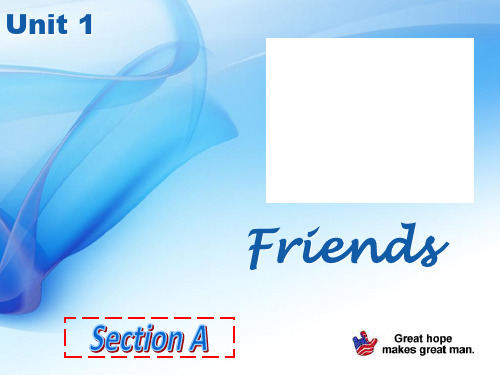
He is helpful.
What are the two girls doing? They are singing at a party.
They are party animals.
聚会迷,热衷于参加社交聚会的人
warmhearted
clever
Tony
friendl
y funny
pretty
hones
Mary
t
sweet
A Click the pictures to find the answers.
录音
Lucy
录音 原文
Here’s an introductБайду номын сангаасon of a friend. Listen and fill.
司超过8%的普通股
,也H是e公’s司B最i大ll 的G个at人e股s.东。1995年
到2007年的《福布斯》全球亿万富翁
排行W榜中ha,t’比s尔h·e盖l茨ik连e续?13年蝉联
世界首富。2008年6月27日他正式退
I出产th微尽i软数nk公捐司给he,比i并尔s把与w美5a8琳0r亿m达美-·h盖元e茨个a基r人t金e财d.
雷锋纪念日。“雷锋精神”激励着
一代又一代人。
卓别林,不列颠帝国勋章佩戴者, “AFI百年百大明星”之一。他幼年
丧父W,h曾o在i游s 艺he?
场和巡回剧团卖艺或
打杂H。e1’9s13C年h,a随rl卡es Chaplin.
尔诺哑剧团去美国演
出,W被h美a国t’导s 演hMe .l塞ike?
纳特看中,从此开始了他的电影生涯。
unit 2 a letter to a friend (reading and writing)

gets to 6 He _________ school at 7:00 every morning.
发信人的姓名 ,地址 Stamp
Nancy Puyang county Vocational School 19 Hongqi Road Puyang 457100
收信人的姓名和 地址
Listen to the text and answer the following questions. 1 Who did Jack write a letter to?
7 With the help of my classmates , my English reading skill is getting__________________. better and better 8 Our teachers show concern about about our study. __________________
Read the text again and translate the following phrases 1 到达 get to 5 在每周的工作日 on weekdays 2 对------关心 show concern about 3 在------帮助下 with the help of 4 越来越好 6 上课 have classes/lessons 7 起初 at first
On weekdays , he ______four classes in the has morning and three in the afternoon. On have classes weekends, he often goes to ____________of Chinese language or goes sightseeing around the beautiful city of Beijing. He tells Nancy his new phone _______and asks her number to phone him or send him text messages. glad Nancy is _______to know that Jack is OK in China
中职英语基础模块上册 Unit3 Campus Life
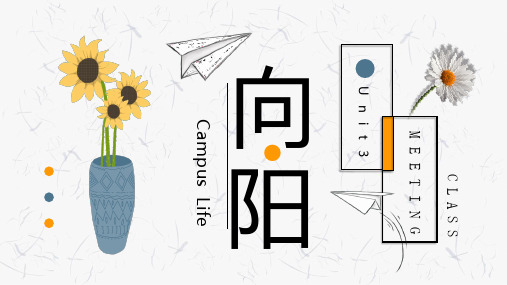
虚词 (意义不完整,不能独立 作句子成分的词)
“名代动→数形副→介冠连感”
friend with
kind adj.和蔼的,亲切的
kindness n.和蔼,友善
be kind to 对……和蔼可亲的
It’s kind of sb. to do sth. ……对某人来说太仁慈了
Eg. (1) The teacher is kind to all of us.
(2) It’s kind ___ me.
The young man always shows off his brand coats.
那个年轻人总是炫耀他的名牌外套
(1) with the help of 在……的帮助下
Eg: With the help of my sister, I finished
my novel.
在我姐姐的帮助下我完成了我的小说
bus
buses
map maps
class classes
potato potatoes
student students
desk desks
woman women
family families
teacher teachers
orange oranges
leaf
leaves
watch watche . city scities . day days . knife knives .
中职英语-公开课教案
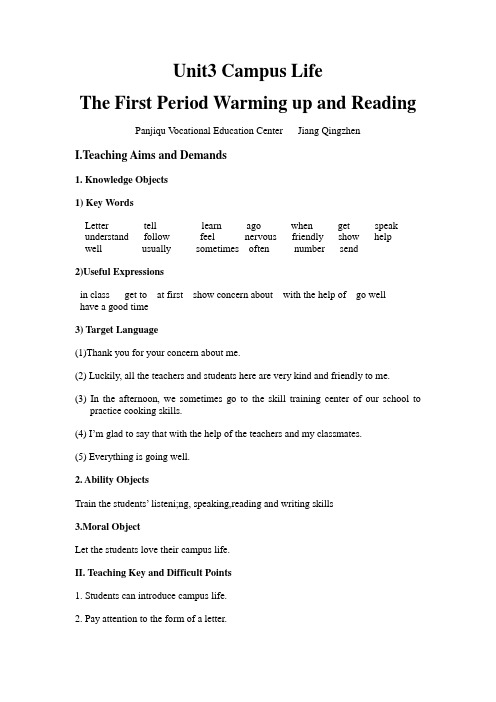
Unit3 Campus LifeThe First Period Warming up and Reading Panjiqu V ocational Education Center Jiang QingzhenI.Teaching Aims and Demands1. Knowledge Objects1) Key WordsLetter tell learn ago when get speak understand follow feel nervous friendly show helpwell usually sometimes often number send2)Useful Expressionsin class get to at first show concern about with the help of go wellhave a good time3) Target Language(1)Thank you for your concern about me.(2) Luckily, all the teachers and students here are very kind and friendly to me.(3) In the afternoon, we sometimes go to the skill training center of our school topractice cooking skills.(4) I’m glad to say that with the help of the teachers and my classmates.(5) Everything is going well.2. Ability ObjectsTrain the students’ listeni;ng, speaking,reading and writing skills3.Moral ObjectLet the students love their campus life.II. Teaching Key and Difficult Points1. Students can introduce campus life.2. Pay attention to the form of a letter.3. Students can master key words and phrases.III. Teaching Methods1.Practice methood .2.Four-skill method.IV. Learning strategies1.Practice2. Role play.3.cooperation.V. Teaching Aids1. Some pictures3. A small blackboard2. A tape recordingVI. Teaching ProcedureStep1 Warming up and review1.Greeting each otherT: Class begins.Ss: Good morning, teacher!T: Good morning, class! Sit down, please.Ss: Thank you.2.Look at the pictures of our new schoolT: Today, I’m very glad. I have some beautiful pictures of our new school to show you , Please look at these pictures. This is our new school. That is a classroom, it’s big and bright . This is a library, That is a dining hall. This is a dormitory and that is a playground. Please read the words “school, classroom, library, playground, dining hall and dormitory” after me.( In this part, let the students master school buildings and equipment teatatively.)3. Ask and answer(1) T: Look at the pictures, ask and answer in pairs with the following sentence sructures:A: What’s this \ that in English?B: It’s a_______.A: What’s in it?B: There are some/ many / a lot of ___________ in it.T: I’ll give you a few minutes to pracice in pairs.(2) Ask a few pairs to practice dialoges in pairs.( In this part, train the students spoken English and let them go over the knowledge of Unit1 and Unit2.)Step2 Presentation1. Lead in the students’ campus lifeT: Just now we saw some school buildings and equipment, but Idon’t know what your campus life is. Can you tell me about it?Ss: Yes, we can.T: How many classes do you have in the morning?Ss: Four classes.T: How many classes do you have in the afternoon?Ss : Three classes.T: Do you have any interesting activities after class?Ss: Yes, we do.(In this part, show the students’ real campus life at first to prepare for the next step.)2. Learn the new words and lead to the text A letter to a Friend.(1) T: From the text I know David’s campus life is rich and interesting . In order to understand the text well, let’s learn the new words in Page 137-138. Ask several students to read the new words to check their previewing.(2) Ask a few students to read the key words and phrases on the blackboard to consolidate key vocabulary in the text again. Key Words: letter tell learn ago when get speak understand follow feed nervous friendly show help well usually sometimesoften number send Useful Expressions :in class, get to at first, show concern about, go well, with the help of, have a good time( In the part, let the students master key words and useful expressions in the text before listining and reading in order to remove reading obstructions.)Step3 Consolidation1.Show the following questions about the text on the small Bb:(1)What does David do in Haidian V ocational School in Beijing?(2) What does David think of all the teachers and students there?(3)How many classes does David have a day trom Monday to Friday?(4) What does David often do on weekends?2. Play the recording and ask the studends to listen to the tape and find the answers, but some students can look at the text as they listen.3. Ask four students to check the answers.(1) He liarns Chinese cooking in Haidian V ocational School in Beijing.(2) They are kind and friendly.(3) He has seven classes a day.(4) He often goes to have classes of the Chinese language or go sightseeing around the great and beautiful city of Beijing.(In the part, let the students get to know the text step by step.)Step4 Practice1. Ask the students to read the text again and to complete the following statements according to the text Page20.2. Check the answers.3. Play the recrding again and ask the students to read after it.T: Please read after the tape and pay attention to pronunciation, intonation and stress.4. The teacher explains knowledge that the students don’t know.5.Ask the students to notice the form of the letter.Step5 Extending1.Piont out the instructions to the students .T: Every student has good friends, but they don’t know how your campus life is going. Can you write a letter to tell him /her about it?Ss: Yes, I can.T: When you write a letter to your friend you should pay attention to the form of a letter. I’ll give you some minutes to write.2.When the students write letters the teacher walks around the classroom and help students who need some help .3. Ask a few students to show their letters that are written by themselves to the other students.Step6 SummaryThe teacher and students sum up knowledge that is learnt in this lesson together.Step7 Homework1.Go over the words and expressions in this lesson.2. Read the text ten times.3. Do the exercises on Page21.Step8 Blackboard DesignUnit3 Campus LifeThe First PeriodWarming up and ReadingSentence Structures:A: What’s this \ that in English?B: It’s a____.A: What’s in it?B: There are some \ mary \ a lot of____ in it.Key Words:Letter tell learn ago when get speak understand follow feel nervous friendly show helpwell usually sometimes often number sendUseful Expressions:in class get to at first go well show concern about have a good time with the help of be friendly to sb.Key Sentence Structures:1. I’m glad to …2. At first, ….3. We have …classes in the morning.4. How are you getting alone?Key Sentences:1. Thank you for your concern about me .2. Luckily, all the teachers and Students here are very kind and friendly to me.3. In the afternoon, we sometimes go to the skill training center of our school to practice cooking skills.4. I’m glad to say that with the help of the teachers and my classmates, everything is going well.Step9 Teaching ReflectionIn this lesson, I took administrative-level teachings A,B, C according to the students’different foundations. I asked the students of poor foundation to do easy exercises and the students of good foundation to difficult exercises and the others to do middle difficult exercises. That’s the case, they could do well and felt successful, so they may be interested in English. In the future, I am going to train some students who are weak at English after class. I hope that all the students in preschool education class 3 can make progress in this school year \academic year.。
- 1、下载文档前请自行甄别文档内容的完整性,平台不提供额外的编辑、内容补充、找答案等附加服务。
- 2、"仅部分预览"的文档,不可在线预览部分如存在完整性等问题,可反馈申请退款(可完整预览的文档不适用该条件!)。
- 3、如文档侵犯您的权益,请联系客服反馈,我们会尽快为您处理(人工客服工作时间:9:00-18:30)。
• They show great concern about my life and study. • 他们非常关心我的学习和生活。
• Show concern about 对…关心
• With the help of the teachers and classmates ,I’m glad to say that everything • Is going better and better. • 我可以很高兴的说,在老师和同学们的帮 助下,一切都变得越来越好。 • With the help of …在…的帮助下 • Better and better 越来越好 形容词比较级+and +形容词比较级(越来越)
• At first ,I couldn’t follow the teachers in class and I felt a little nervous. • 起初,在课堂上我听不懂老师讲课并感到 有点紧张。
• At first 起初,首先 • Follow 跟得上,本文中指“听得懂” • A little 有点
• We have four classes in the morning and three in the afternoon on weekdays. • 我们平时上午上四节课,下午上三节课。 • • On weekdays 在每周的工作日 • Class 班级,课
• In the afternoon ,we sometimes go to the skill training center of our school to practice cooking . • 在下午,我们有时去学校的技术训练中心 去练习烹饪。 Sometimes 有时 Skill training center 技术训练中心 Practice 练习 practice doing sth练习做某事
Unit2 A Letter to a Friend
• Dear Nancy,Greetings from Beijing. • 亲爱的南希,来自北京的问候 • Dear 在书信开头表示客套,常与职衔,称 呼或名字连用。 • Greeting 问候(名词) • Greet 打招呼(动词)
• Thank you for your concern about my school life in china. • 谢谢你关心我在中国的学校生活。
• How are you getting along ? • 你一切还好么? Get along 进展
I miss you very much . 我很思念你 Miss 思念、丢失
• My new phone number is 135……… • 我的新电话号码是…… • You may send text message to me on the phone . • Send …to 发送 • Send sth to sb 送某人某物 • Text message 短信
• Get …Got(过去式) • When 当…的时候 • Be strange to sb 对于…来说是陌生的
• You know ,I can only speak and understand very little Chinese . • 你知道,我只能讲和理解非常少的汉语。
• Only 仅,只 • Little 少,用于修饰不可数名词 • Few 少,用于修饰可数名词复数
• With best wishes. • 致以最美好的祝福。 • Good …better…best
• Luckily ,all the teachers here and my classmates are very kind and friendly. • 幸运的是,这里的所有老师和同学们都非 常善良和友好。
• All 所有的,用于3人以上 • Kind 善良的 • Friendly 友好的
• Thank…for..为…而感谢 • Be concern about 关心,关注 • School life 学校生活
• I’m writing to tell you that I’m having a good time here and I’m lucky to be a student of Xinhua Vocational School now. • 我现在写信告诉你,在这里我过的很愉快, 而且很幸运成为新华职校的一名学生。
• After class , we have many interesting activities . • 课后,我们有许多有趣的活动。
• interesting 有趣的,形容物 • Interested 有趣的,形容人 • Activity …(复数)
• On weekends, I often go to have classes of Chinese language or go sightseeing around the great and beautiful city of Beijing. • 在周末的时候,我经常去上汉语课或者去 美丽伟大的北京周围观光。 • On weekends在周末 • Go sightseeing 去观光
• Come ---Came (过去式) • Chinese cooking 中国烹饪 • 八大菜系(the eight major components of Chinese cuisine)
• When I got to this school ,everything was strange to me. • 我到这所学校时,一切对我来说都是陌生 的。
• Am writing 正在写,是现在进行时的形式 (be doing ),表示现在正在进行的动作。
• Have a good time 过的愉快 • Be lucky to do sth 很幸运去做某事
• A month ago ,I came to Beijing to learn Chinese cooking. • 一个月前,我来到北京学习中国烹饪。
